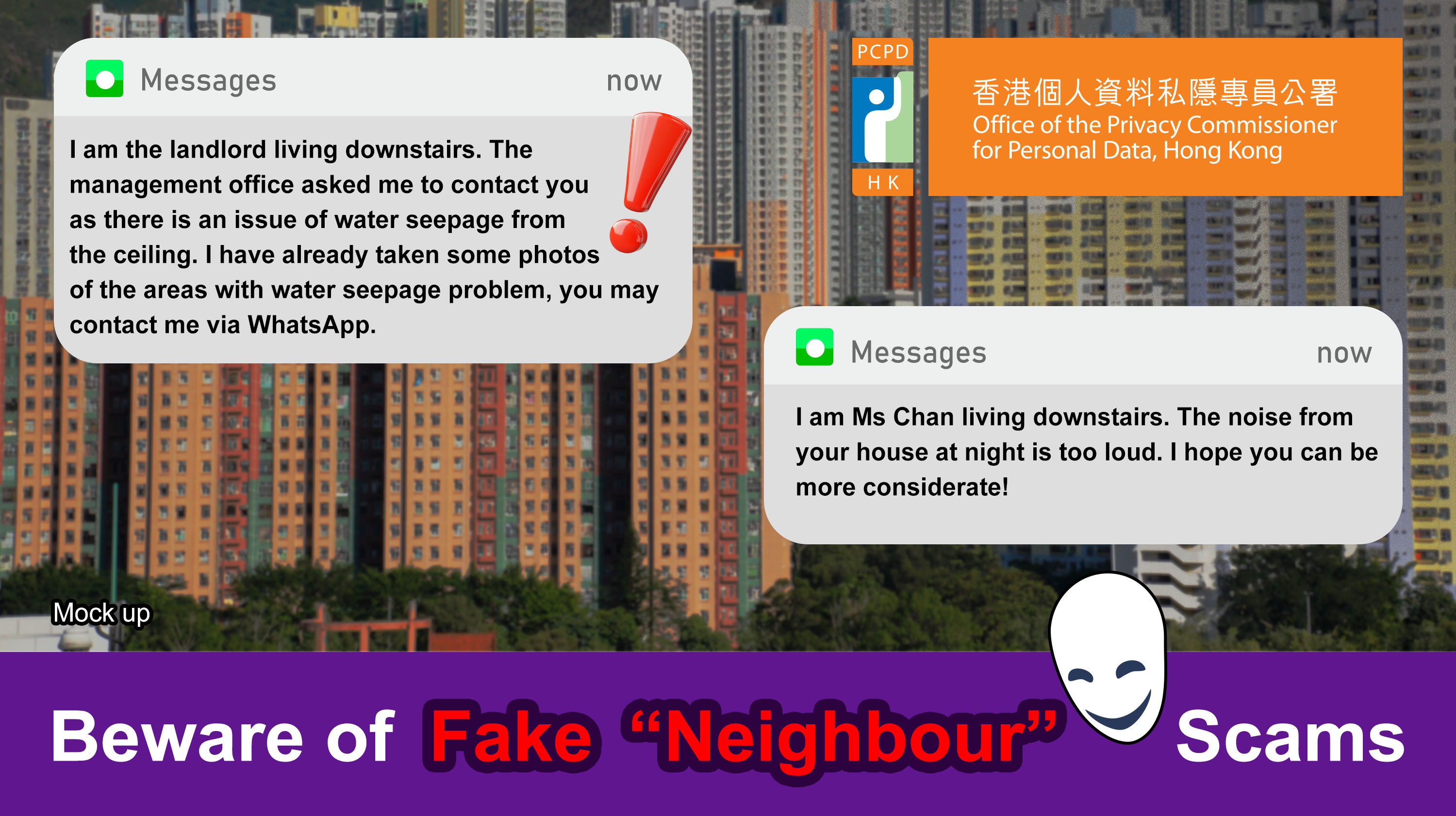Media Statements
Privacy Commissioner's Office Urges Caution against Fake Neighbour Scams
Date: 19 May 2025
Privacy Commissioner’s Office Urges Caution against Fake Neighbour Scams
The Office of the Privacy Commissioner for Personal Data (PCPD) has noted the emergence of a new type of fraudulent trick. Residents in different housing estates across Hong Kong have received SMS messages purporting to be from their neighbours, complaining about issues such as water seepage or noise, and asking the residents to contact them via instant messaging applications. Subsequent verifications by estate management offices confirmed these messages to be fraudulent. Since March 2025, the PCPD has received four related enquiries and two complaints, involving different housing estates in Kowloon and News Territories.
The PCPD understands that the fraudsters impersonated victims’ neighbours and sent SMS messages complaining about water seepage or noise issues in their flats, inducing the victims to respond or engage in further discussions via instant messaging applications. Once the conversations began, the fraudsters would pretend to be interested in developing a relationship with the victims or used other tactics to gain their trust, ultimately aiming to swindle money and/or personal data out of them. Fraudsters might also trick the victims into clicking on suspicious hyperlinks that would lead to fraudulent websites designated to obtain the victims’ personal data.
The Privacy Commissioner for Personal Data, Ms Ada CHUNG Lai-ling, appeals to members of the public to be cautious of the new type of fraudulent trick, particularly fraudulent SMS messages or telephone calls impersonating their neighbours, and to avoid disclosing personal data to others arbitrarily. If members of the public receive suspected fraudulent SMS messages or telephone calls, they should first contact their estate management offices to make enquiries or seek clarification.
The PCPD offers the following tips to the public to safeguard their personal data privacy and to stay vigilant against scams:

The PCPD understands that the fraudsters impersonated victims’ neighbours and sent SMS messages complaining about water seepage or noise issues in their flats, inducing the victims to respond or engage in further discussions via instant messaging applications. Once the conversations began, the fraudsters would pretend to be interested in developing a relationship with the victims or used other tactics to gain their trust, ultimately aiming to swindle money and/or personal data out of them. Fraudsters might also trick the victims into clicking on suspicious hyperlinks that would lead to fraudulent websites designated to obtain the victims’ personal data.
The Privacy Commissioner for Personal Data, Ms Ada CHUNG Lai-ling, appeals to members of the public to be cautious of the new type of fraudulent trick, particularly fraudulent SMS messages or telephone calls impersonating their neighbours, and to avoid disclosing personal data to others arbitrarily. If members of the public receive suspected fraudulent SMS messages or telephone calls, they should first contact their estate management offices to make enquiries or seek clarification.
The PCPD offers the following tips to the public to safeguard their personal data privacy and to stay vigilant against scams:
- Be vigilant: Think twice before providing any personal data, verify the purpose of collection of such data and whether it is necessary to provide them. Avoid disclosing personal data to others arbitrarily, clicking on or scanning suspicious links and QR codes, or logging into any suspicious websites;
- Authenticate the identities of senders: Even if the senders can provide your personal data in their SMS messages, if you are in doubt about their identity, you should verify the authenticity of the senders or relevant organisations through other contact methods;
- Keep an eye on your accounts and transaction records: Regularly check online banking for any unusual log-in activities, unauthorised transfers or transactions in your bank accounts or credit cards;
- Password protection: Change the passwords of online banking accounts from time to time and enable two-factor authentication (if available). Never share passwords with anyone;
- Fraud prevention information: Pay attention to the fraud prevention information published by the PCPD, the Police or relevant organisations. Share the information with friends and relatives (especially the elderlies and youngsters) to enhance their awareness of fraud prevention.

Residents in different housing estates across Hong Kong have received SMS messages purporting to be from their neighbours, complaining about issues such as water seepage or noise, and asking the residents to contact them via instant messaging applications.